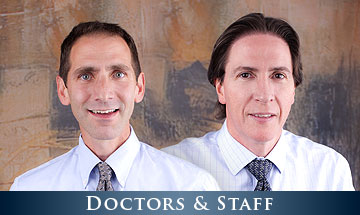OMS PROCEDURES
WISDOM TEETH
Wisdom teeth, also known as third molars, are the last teeth to erupt in the mouth. Wisdom teeth generally erupt between the ages of 16 and 25. When eruption occurs in proper alignment with the other teeth and the gum tissue around the wisdom teeth remains healthy, they do not require removal. Unfortunately, in the majority of people, there is not enough space to allow some or all of the wisdom teeth to properly erupt, and they remain fully or partially beneath the gum tissue. These improperly or incompletely erupted wisdom teeth are called "impacted wisdom teeth," and should be removed.
Partially or fully impacted wisdom teeth can cause pain, and in most cases will develop inflammation and infection around the unhealthy gum tissue. Research has shown that these infections and areas of ongoing inflammation can contribute to overall health problems, such as heart disease. In some cases, impacted wisdom teeth are associated with the development of cysts or tumors, which destroy the adjacent teeth, nerves, and the surrounding jaw bone.
To prevent these problems, it is recommended that wisdom teeth be removed at an early age, rather than waiting until adverse symptoms arise. In general, earlier removal of wisdom teeth results in a less complicated surgery and faster healing time. A study by the American Association of Oral and Maxillofacial Surgeons strongly recommends that wisdom teeth be removed by the time the patient is a young adult in order to prevent future problems and ensure optimal healing.
 |
Click here for an informational video about “3rd Molar Surgery” (Wisdom Tooth Removal) |
THE PROCEDURE
In most cases, the removal of wisdom teeth can be done at our office with a combination of local anesthetic and intravenous sedation for your comfort. Prior to your procedure, your surgeon will discuss the planned method of anesthesia, possible risks, and what to expect after surgery. Before returning home, you will be given a post-operative instructional packet, extra gauze, a plastic syringe for irrigating the extraction sites, and any necessary prescriptions.
AFTER SURGERY
Following surgery, you will likely experience some swelling and soreness of the mouth and jaw, which are part of the normal healing process. Cold compresses may help decrease the swelling, and medication prescribed by Dr. Caso or Dr. Ash can help manage the discomfort. A soft food diet is recommended for several days following surgery and later you may progress to your normal foods. Please see the Surgical Instructions link for more details on recommendations and limitations after surgery.






